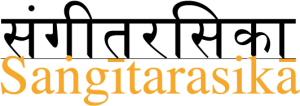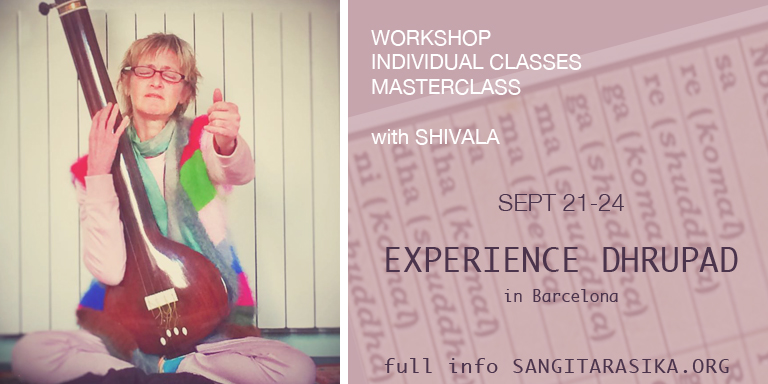Shivala …
…is a professional musician and an expert in Dhrupad. After over 30 years of training in classical and Indian music, Shivala began to study Dhrupad in 2001 with the Gundecha Brothers, renowned among the best Dhrupad singers. Since 2005, when she graduated from the Dhrupad Institute of Bhopal (created by the Gundecha Brothers), she has been teaching and giving Dhrupad concerts throughout Europe. Committed to safeguarding the scales of Dhrupad, Shivala is working in collaboration with her teacher Ramakant Gundecha and a Norwegian programmer to digitize and integrate these valuable scales into a software that will be available soon.
To celebrate her visit to Barcelona we present you with a full week of Dhrupad activities to share and learn with Shivala:
– Weekend Dhrupad Workshop: rāga Śivaranjanī
SAT & SUN 22-23/09 9:30 to 17:30
– Masterclass: rāga Yaman
MONDAY 24/09 11 to 13:30
– Private classes
FRIDAY 21/09 (a choice of 1hr timeslots will be available to those registered & will need to be booked before the 20th)
Hindustani music and Dhrupad
The Indian musical system has two central axes; Rāga and Tāla. The rāgas are melodic modes from which music develops. Each rāga uses a specific set of musical notes and the way these notes relate to each other define the character and essence of each particular rāga. Traditionally, each rāga is associated with a specific time of the day, season or a certain emotion ‘rasa’.
The other main axis and essential element of indian music is its rhythmic system; the Tāla. This has evolved over thousands of years and is considered an art form in itself. At its foundations are the concepts of time, space and sound perception. The Tāla system gives much attention to the aspects of composition and improvisation, and a broad spectrum of rhythmic, structural and timbral variety.
Dhrupad is one of the oldest genres of Hindustani classical music and is based on natural harmonics. This refined music has the power to amaze us by its simplicity and purity. It resonates with our souls and reunites us with our true nature.
It has its’ origins around the 15th century and was closely connected to the vaishnava devotional sect, although it soon became the official music of the Hindu and Mughal courts until the 19th century.
During the last fifty years the genre had been through an important revitalization thanks to the recent generations of musicians such as the Dagar Brothers, Pt. Vidur Mallick and sons, Zia Mohiuddin, Zia Fariduddin Dagar, R. Sanyal, Gundecha Brothers and Udai Bhawalkar that, together with todays generation of young musicians, are going deeper to explore and widen the confines of rāga music, as well as teaching this tradition both in India and around the world. The Dagar lineage gives special emphasis on intonation. Their sound is characterised by long and sustained notes, especially in the first part of the ālāp, which is presented in an extended form. For this part, specific syllables are used at the end of which the fixed poetic composition or bandiś and its rhythmic-melodic variations occur.
Musicians and musicologists such as Alain Danielou brought this sonority, hitherto unknown, to the Western public and from the mid-twentieth century, western artists such as Shivala Morfoisse, Amelia Cuni, Francesca Cassio, Marian Svasek and Nancy Lesh among others, have enriched and extended the study of Dhrupad outside of India.
Benefits of Dhrupad singing:
- Improves the quality and richness of the voice
- Develops the musical ear and refines sensitivity
- Generates harmony and well-being in the body, mind, emotions and environment
Sing with Shivala contents
Yoga of sound, respiratory and vocal techniques
– breathing exercises to make the voice stable and harmonious
– a sound yoga based on the root sounds of the five elements
– to find your natural voice and use it with maximum efficiency a unique and simple vocal technique that develops the values of the heart, brings great happiness, enriches and softens the tone of the voice
Rāga in Dhrupad style
– Micro-tuning in rāga music (vocal and not tempered instruments)
– Development of ālāp
– Development of rhythm; tāla and laya practice
– Learning a traditional fixed composition or bandiś, set to a specific rāga and tāla
Private lessons
– techniques to work with your natural voice (voice placement, correction of any errors)
– Correct positioning of notes
Soon, everyone appreciates the great beauty of the sounds and rejoices in the well-being they provide. The practice being very natural, the results often exceed our expectations.
Dhrupad Week is for anyone looking for harmony and well being, anyone who wants to explore voice and sound, regardless of technical level or musical experience. Whether you are a professional musician or a beginner, you will discover the power of your sound and a new dimension to music.
Both group workshops and individual lessons are on offer over this week is highly recommended for singers and instrumentalists (non-tempered instruments).
Each participant will receive a booklet and a recording of the course with accompaniment on tānpūrā and exercises to practice at home.
* Please note : the workshop will be given in English with translation into Catalan or Spanish (if needed).
Weekend Workshop Schedule
September 22st and 23nd
9:30am – 17:30pm.
Masterclass rāga Yaman Schedule
September 24th
11 am – 13.30pm
Private class Schedule
September 21st
9.30am – 17.30pm
(1hr timeslots will be available for
booking after registration)
Fees
Full weekend: 170€/ One day: 85€
*Reduced price for full time students, pensioners and unemployed: 120€/60€
Private class and masterclass
40€/ each
Information and registration (Eulàlia)
sangitarasika@gmail.com +34 653525021
Reservation is 50% of the fee & is nonrefundable
Venue
Gungur Barcelona
c/Sepúlveda 85, 08015 Barcelona
Metro L1 Rocafort
Organized by:
In collaboration with Shivala Morfoisse and Dhrupad Association


